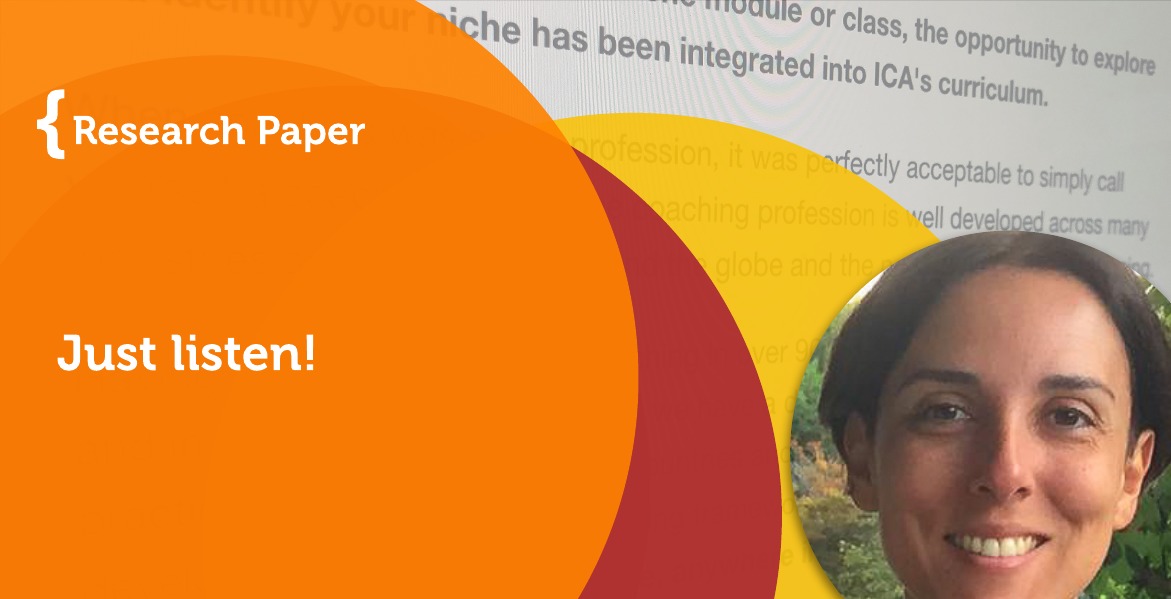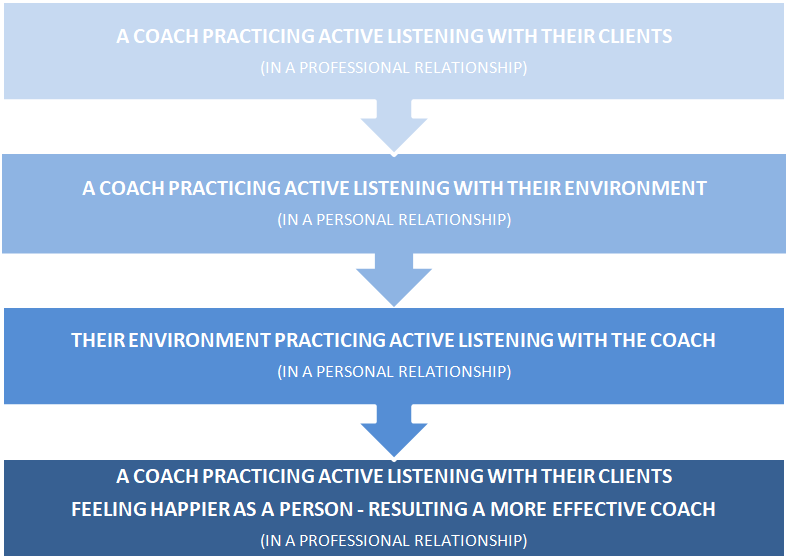 Research Paper By Lucie Petrelis-Petra
Research Paper By Lucie Petrelis-Petra
(Life Coach, LGBTQIAS+, SWITZERLAND)
A personal tribute to the most valuable coaching skill and its impact on my life.
Sometimes it only takes an hour
I started my journey at the International Coaching Academy (ICA) 11 months ago, and since then to this day, I can say with almost certainty, that I am not the same person anymore. The learning and the switch of perspectives in so many areas have changed the way I think, act, and am, forever. I remember so vividly the 7th of June 2019 when I attended my very first theoretical class without having any idea of what to expect. I was so excited and ready to learn all these new skills that would bring me closer to my dream of becoming a coach and supporting others. Little that I knew the impact that one hour would have on me, not only as a coach but also as an individual. When the session was over, the expression on my face was as if I had seen a ghost. My two hands were covering my mouth, forcing myself to keep quiet, to keep my own self quiet. My eyes were wandering around the empty room, trying to understand what just happened to me. I was in a total state of shock. Without further due, I will share with you the name of that class which was: Power Listening!
Santa, Really?
While trying to get over the effect of that strong slap across my face, I realized that I had never really listened to anyone in my life before. I felt so disappointed with myself, especially since I thought that listening and supporting others was my strong feature as a person. Growing up, I would always think that “ok, I failed in this area, but at least I am such a good friend trying to support others.” That thought would cheer up my ego, I suppose. When someone needed support, I would run to them, listen for a bit, and then interrupt them and try to convince them to follow my advice, as if I had all the answers. Becoming aware that I never fully listened to them, felt as if a wall broke down in front of my eyes – as if I had just been told that Santa Clause didn’t exist. It was then that I thought about my options. I could either sit and wonder about my so far quality as a girlfriend, friend, daughter, colleague, neighbor or find ways to adapt the skill of active listening and support others the way they need to be supported and not the way I thought was best for them based on my personal experiences and judgment. That very first day was the moment that I understood that being a student at the ICA, was the right place to be.
Erase and re-write
The hardest part so far on becoming a coach was to unlearn behaviors I didn’t even realize that I had. And then, slowly, class after class, peer coaching after peer coaching, I started to take the shape of a coach.
The Academy taught me how to be a coach, how to behave with a client, what are the components of a coaching session and so many more things. But since behind the coach is an actual person, I couldn’t help myself from getting impacted by this new knowledge and use it also in my personal life. I filtered the information to be suitable from “the client” in a coaching session to my everyday life with my partner, my close friends, and my family – just to see what that could bring me, like being in an experiment. The main feature of a coach that I wanted to develop and adopt with my loved ones was: active listening.
Where the coach meets the person that meets the coach
Of course, a daily exchange with others is not a coaching session with a 20-80 % rate of talking and listening. But that didn’t mean that I couldn’t find a way to balance between listening and talking to them. So, I decided to put my plan into action and start to really listen to them in every opportunity. To put my judgment and ego aside, open my heart, listen to their words, feel their emotions, pay attention to their facial and eye expressions, to their gestures, and even to hear their silences. It was and still is very challenging to manage to hold myself from responding to them right away. But since I managed to improve by practicing it, I even started to feel a form of relief. I didn’t have to worry anymore if my advice was good enough or how to put all my energy to convince them about what they should do. With this new behavior of active listening, I can actually support them more than before. It requires even less effort since I don’t have to put myself into the role of the rescuer anymore. Nowadays, if someone from my environment wants to be saved, I wait to read the signs of their invitation towards that end from the first – at least most of the time! If I don’t receive that sign of needing specific guidance, I just listen and support them through my presence.
Listening to you, listening to me
Thinking about all the benefits that adopting this behavior could bring on all parties made me think that active listening should be a prerequisite for all kinds of relationships. Developing the skill of active listening can only make us better humans. Just imagine the impact on our personal life but also at a societal level if we really listened to each other. Additionally, once we’ve learned how to listen, we will be ready to listen to ourselves as well. We would invest the needed time to listen to what someone is saying or not saying, and we would invest the needed time to listen to what we are saying or not saying to others and to ourselves. How much awareness this skill could bring into everybody’s life. It could transform us, our relationships, and our society. You may wonder, why should we first learn to listen to others and then to ourselves? I believe that being able to really listen to ourselves is the hardest thing. Listening to others is easier and a good start to put the skill of active listening in practice and then be more prepared to use it also for ourselves. But if you do feel ready to listen to yourself before listening to others, please, keep doing that and then open your heart towards listening to others too.
The manual to listen to each-other actively
Learning to listen
Since not all humans are natural-born coaches, it is very normal that by talking to the people around you about power listening and active listening, they might not know what it means or they might think that this is what they have been doing already. A constructive option would be to put in place together an easy-to-use communication manual with the dos and don’ts of what it means to us to be listened to actively.
The Russian Roulette
Why do we need a manual, we are not machines. Yes, that is correct, but why do we assume that we should instinctively know in advance how someone else is functioning? It’s already challenging enough to understand ourselves. So, understanding others without even asking them what their needs are is almost like guessing. And we often guess wrong.
Don’t jump that fast
Putting in place such a manual and managing to stick to its definition is not an easy task, especially since we have the natural tendency and instinct to answer back to someone right away. The reasons for that could be a self-defense reaction on what we heard, or to jump in and give guidance based on our own perspective, or comfort someone the way we would expect to be comforted. And in general, give to the other what we think he needs based on what we need. But how often do we really know what the other person needs? By being open to listen and be willing to give to the other person the chance to say what they need, how much more fruitful and in good terms, any relationship could be.
Co-creating the “Just listen” manual
This personalized manual could be put in place by life-partners, friends, family members (parents with their children, siblings, etc.), flat-mates, business associates, colleagues, coaches’ with their team members, teachers’ with their students, ones’ self with ones’ self, and many more human relationships.
To create a manual like that could feel like time-consuming at first, but just imagine how much time would be saved over these endless fights and miss-understandings. Opening a new channel of communication will make these relationships more substantial and meaningful. It’s a way to educate ourselves and each other on how to understand the other person without throwing random words or silences to them, hoping that they get what we mean.
Building solid and better relationships with those that matter to us the most
The content of the manual
1) Understand each other’s needs by asking one another:
Understand expectations
2) All parties should answer the defined questions – Including ourselves by ourselves.
3) Keep some notes on the collected information.
4) When someone “knocks on your door” and wishes to talk to you, define what the initial purpose of your interaction at the specific moment is:
5) Practice it in every given occasion until listening and being heard becomes a natural behavior between people
6) Review the outcome. How do you both feel about this new way of interacting together? Did it bring you closer or further apart? How can you make it even more impactful?
The nature of the relationship will define the number of questions and the deepness of the answers required.
It’s all Greek to me
When having a conversation with someone, paraphrasing, or playing back to them what we understood, could be very beneficial for our relationship. Especially when people from different countries, cultures, and backgrounds, are trying to communicate together, using a common language that is not their native language. Not speaking the same language could be the source of so many miss-understandings and miss-interpretations. This manual could minimize the language and cultural gap and bring harmony among people.
Conclusion
Learning how to listen to one another actively could transform our relationships and our lives forever. Since the perceptions and the needs of each individual are so unique, it’s unfortunately so easy to hurt one another by not knowing how to listen or how to support each other.
By using the extraordinary coaching skill of active listening in our everyday life can support us to become better people and also educate others on how to adopt this behavior as well. By listening and being heard back, could transform this society by allowing people to live more happily and joyfully together. Communication is the key to every single situation. But to be able to do that, first, please, just listen!
I will always remember that very first class. The day I started to listen.
Don’t go just yet, check out the next page:
The effect of active listening to a coach’s’ life with his clients and with his environment

Thank you for making it to the end!